外研版(2019)必修 第一册Unit 2 Exploring English Understanding Ideas名师课件(共38张PPT)
文档属性
| 名称 | 外研版(2019)必修 第一册Unit 2 Exploring English Understanding Ideas名师课件(共38张PPT) | 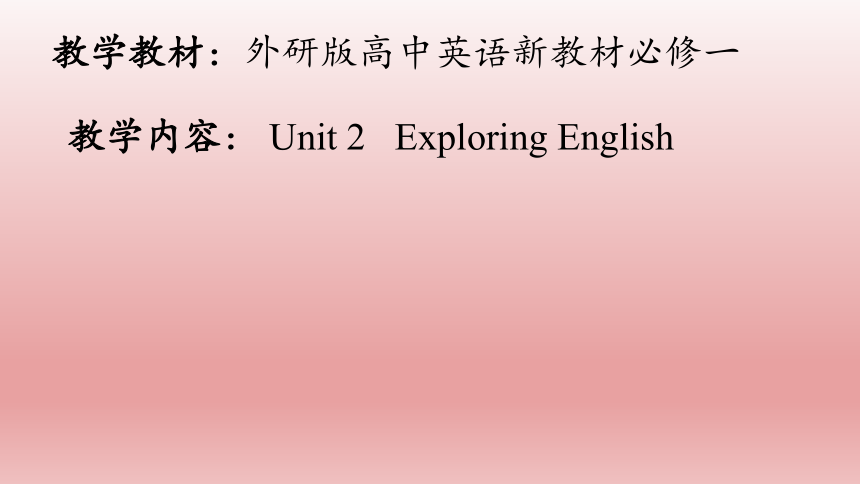 | |
| 格式 | pptx | ||
| 文件大小 | 5.5MB | ||
| 资源类型 | 教案 | ||
| 版本资源 | 外研版(2019) | ||
| 科目 | 英语 | ||
| 更新时间 | 2023-02-26 09:11:26 | ||
图片预览

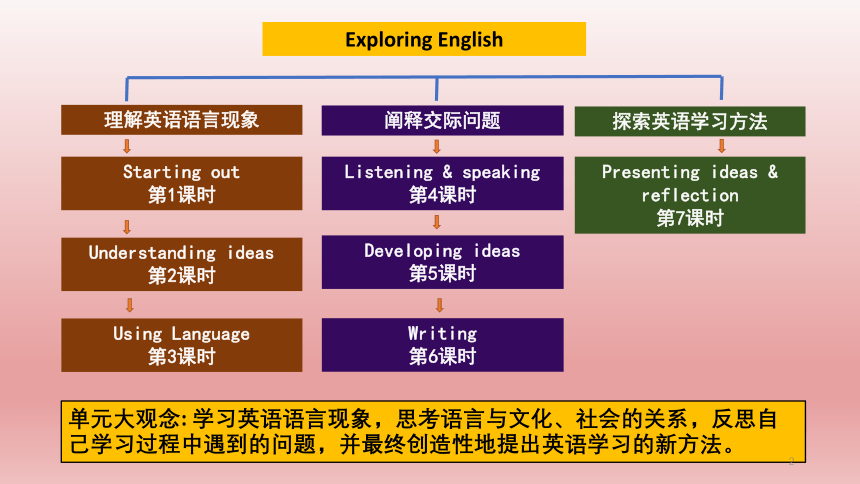
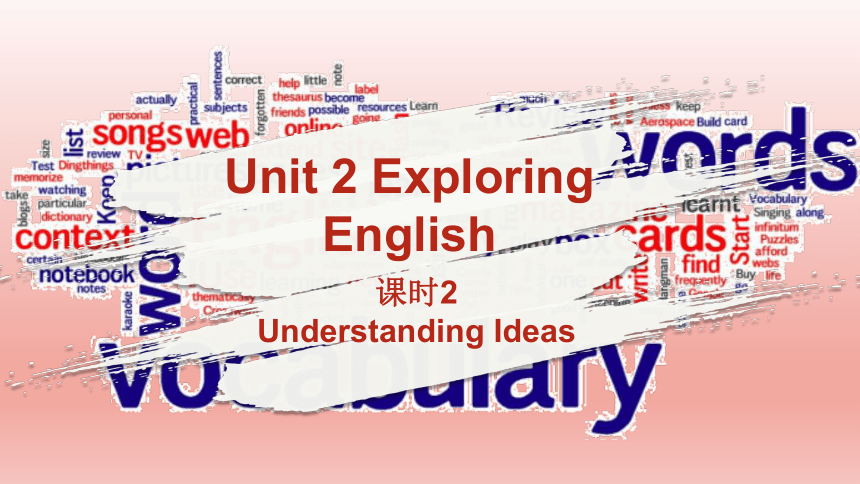


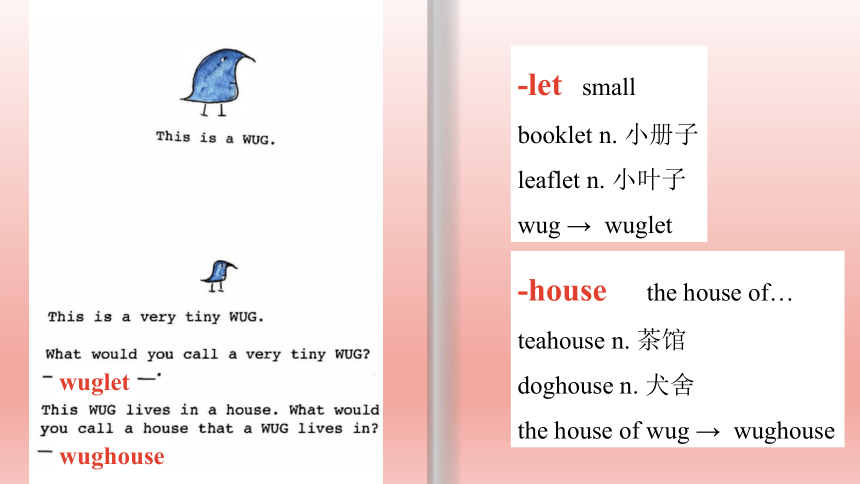
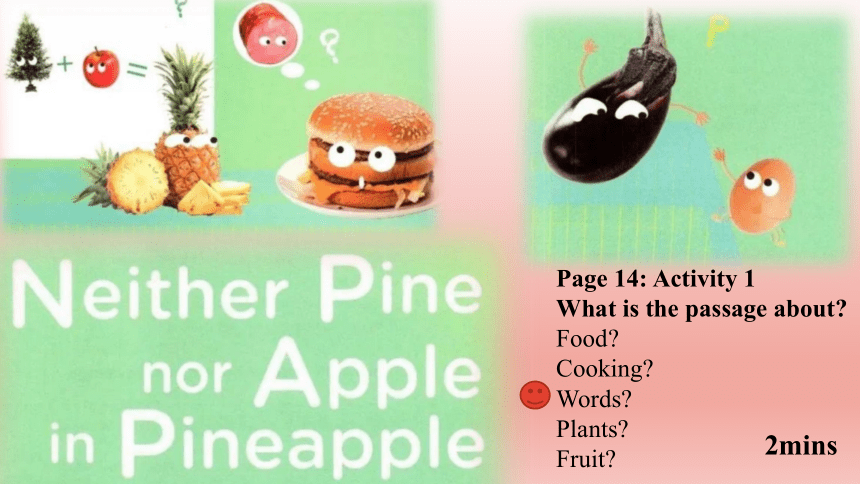
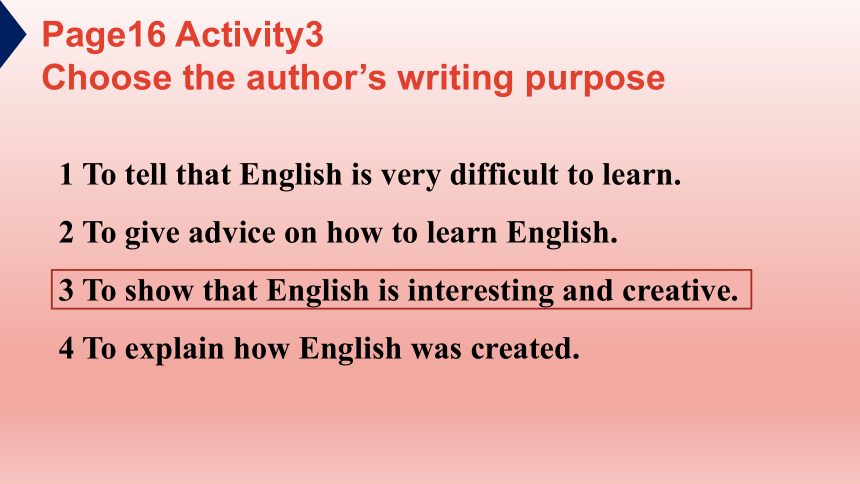
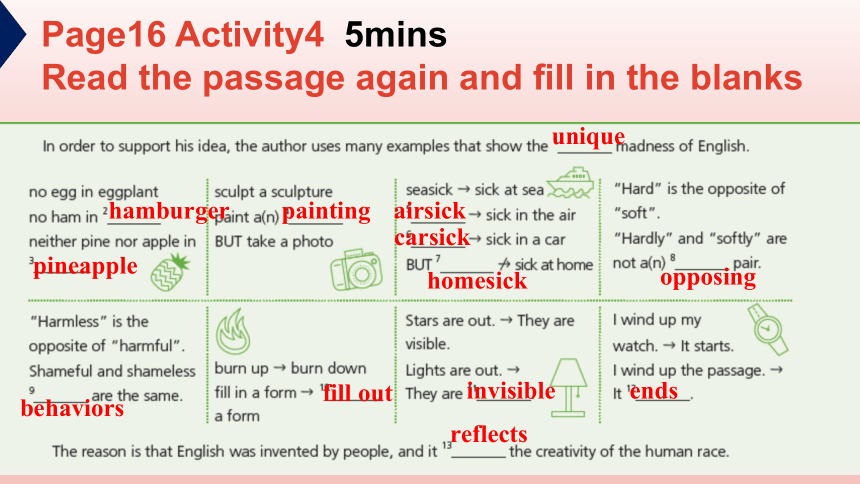
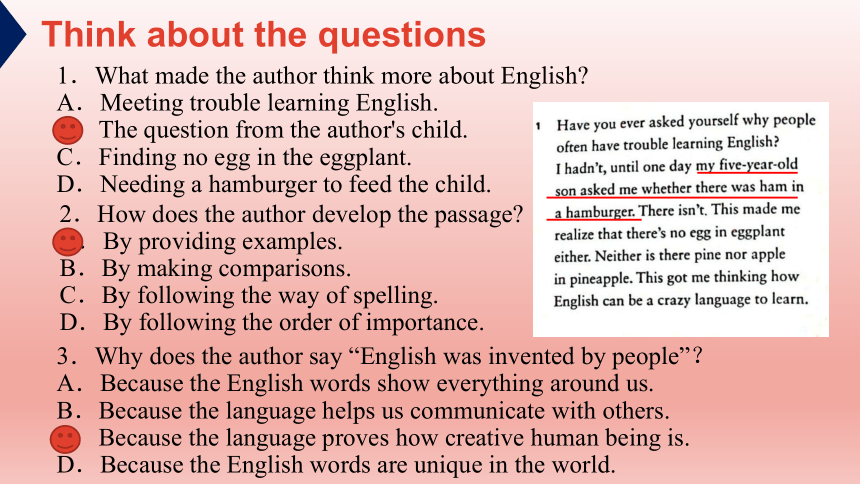
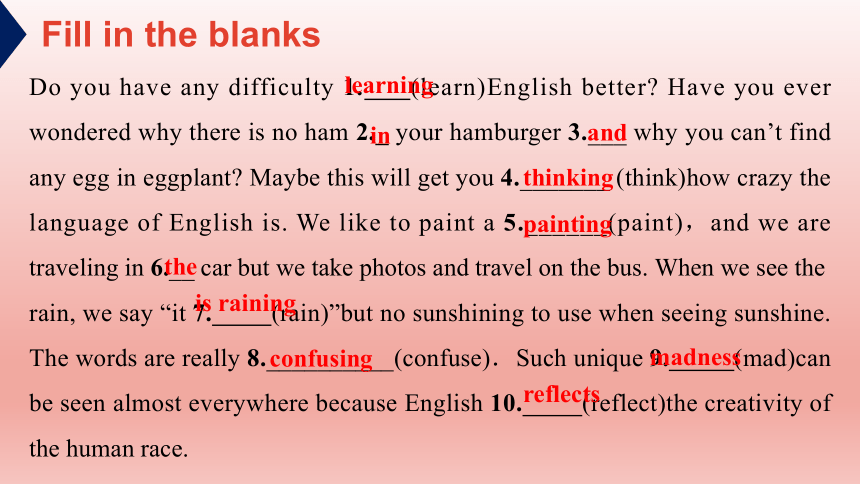
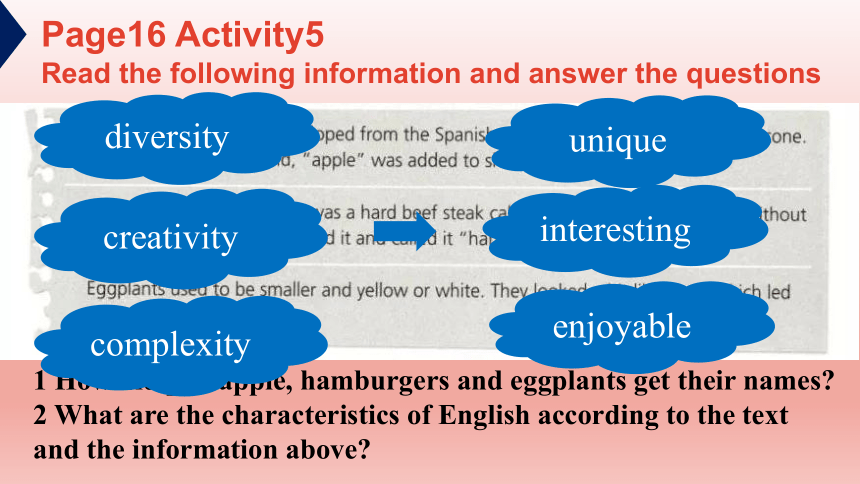
文档简介
(共38张PPT)
教学教材:外研版高中英语新教材必修一
教学内容: Unit 2 Exploring English
Exploring English理解英语语言现象阐释交际问题探索英语学习方法Starting out第1课时Understanding ideas第2课时Using Language第3课时Listening & speaking第4课时Developing ideas第5课时Presenting ideas& reflection第7课时单元大观念:学习英语语言现象,思考语言与文化、社会的关系,反思自己学习过程中遇到的问题,并最终创造性地提出英语学习的新方法。Writing第6课时Unit 2 Exploring English
课时2
Understanding Ideas
To test how well children had learned the basic rules of English words.
The Wug Test
wugs
ricked
quirkier
quirkiest
wuglet
-let small
booklet n. 小册子
leaflet n. 小叶子
wug → wuglet
-house the house of…
teahouse n. 茶馆
doghouse n. 犬舍
the house of wug → wughouse
wughouse
Page 14: Activity 1
What is the passage about
Food
Cooking
Words
Plants
Fruit
2mins
Page16 Activity3
Choose the author’s writing purpose
1 To tell that English is very difficult to learn.
2 To give advice on how to learn English.
3 To show that English is interesting and creative.
4 To explain how English was created.
Page16 Activity4 5mins
Read the passage again and fill in the blanks
unique
hamburger
pineapple
painting
airsick
carsick
homesick
opposing
behaviors
fill out
invisible
ends
reflects
1.What made the author think more about English
A.Meeting trouble learning English.
B.The question from the author's child.
C.Finding no egg in the eggplant.
D.Needing a hamburger to feed the child.
Think about the questions
2.How does the author develop the passage
A.By providing examples.
B.By making comparisons.
C.By following the way of spelling.
D.By following the order of importance.
3.Why does the author say “English was invented by people”?
A.Because the English words show everything around us.
B.Because the language helps us communicate with others.
C.Because the language proves how creative human being is.
D.Because the English words are unique in the world.
Do you have any difficulty 1. (learn)English better Have you ever wondered why there is no ham 2. your hamburger 3.___ why you can’t find any egg in eggplant Maybe this will get you 4._______ (think)how crazy the language of English is. We like to paint a 5.______(paint),and we are traveling in 6.__ car but we take photos and travel on the bus. When we see the rain, we say “it 7. (rain)”but no sunshining to use when seeing sunshine. The words are really 8.__________(confuse).Such unique 9. (mad)can be seen almost everywhere because English 10. (reflect)the creativity of the human race.
Fill in the blanks
learning
in
and
thinking
painting
the
is raining
confusing
madness
reflects
Page16 Activity5
Read the following information and answer the questions
1 How did pineapple, hamburgers and eggplants get their names
2 What are the characteristics of English according to the text and the information above
diversity
creativity
complexity
unique
interesting
enjoyable
What do you find most challenging about learning English
How do you deal with this
Think and Share
words
pronunciation
grammar
communication
interest
4mins
1. What has made more and more people decide to learn English in recent years
2. According to some theories, what is the best way to learn a foreign language
3. How can teachers try to create a rich language environment in the classroom
4. What extra work can you do outside the classroom
Watch a video
What is the worst kind of fish
Selfish
What is the longest word in English
Smiles
because there is a "mile" between the first letter "S" and the last letter "s"
Let’s play English!
Why is a river rich
Because it has two banks.
Why did a man throw the butter out the window
He wanted to see the butterfly.
Let’s play English!
Brainstorming
Could you give some Chinese examples that can cause misunderstandings
Language points
1. Have you ever asked yourself why people often have trouble learning English
你有没有问过自己,为什么人们在学习英语时经常遇到困难?
have trouble (in) doing
have difficulty (in) doing sth. 做某事有困难
①Students often have trouble (in) understanding different English accents.
学生常常很难理解不同口音的英语。
②If you are nearsighted, you have trouble (in) seeing distant objects.
如果你是近视眼,你很难看清远处的物体。
1. I have trouble expressing myself in English.
我用英语表达有困难。
2. 这些人寻找新的工作有困难。
These people have trouble (in) getting new jobs.
Translation
①He likes neither butter nor cheese.
他既不喜欢黄油也不喜欢乳酪。
②Neither you nor he is good at English.
你和他都不擅长英语。
①I won't do such a thing. Neither will he.
我可不做这样的事。 他也不会。
②Neither has he done it, nor will he do it.
他没有做过这事,他以后也不会做这事。
2. Neither is there pine nor apple in pineapple.
pineapple(菠萝)里既没有pine(松树),也没有apple(苹果)。
neither...nor...
既不……也不……
当连接两个主语时,谓语动词单复数应遵循“就近原则”。
谓语
主语
Neither 置于句首引起倒装,结构为
neither + 情态动词或助动词或系动词be + 主语。
neither...nor...连接两个句子时,通常两个句子都要用倒装式。
3. This got me thinking how English can be a crazy language to learn.
这让我陷入思考:对于学习者而言英语到底可以有多疯狂呢?
宾语从句
get sb./sth. doing...
let sb./ sth. start to do sth 让某人/某物做......
①Once we got the heater going, the car started to warm up.
我们一启动加热器,汽车就开始预热。
②It is hard to get him doing his homework before dinner everyday.
想要让他每天晚饭前做作业是很难的。
③His words get me thinking.
他的话使我陷入了沉思。
1. In the end, we got the children cleaning the playground.
最后,我们让孩子们把操场清理干净了。
2. 他问他为什么必须一个人去。
He asked why he had to go alone.
3. 我不知道他是否能及时到。
I don’t know whether he’ll arrive in time.
Translation
①Speaking of travel, have you booked our hotel yet
说到旅行,你预定旅馆了吗?
②Speaking of youth, people of different ages have different performance.
说到青春,不同年龄段的人有不同的表现。
4. And speaking of home, why aren’t homework and housework the same thing
说到家,为什么homework(家庭作业)和housework (家务)(这两个单词看起来意思很像却)不是一回事呢?
speaking of
used for introducing another topic that relates to one either you or someone else has just mentioned 说到;谈及
1. And speaking of presents, we have 100 exclusive fragrance collections to give away.
2. 说到钱, 它很重要但不是全部。
说到礼物,我们有 100 份限量版香水要赠送。
Speaking of money, it's important but it's not everything.
Translation
5. English was invented by people, not computers, and it reflects the creativity of the human race.
英语是人创造的,不是计算机发明的,它反映了人类提升的创造力。
vt & vi 反射 (光、热、声等):
Without the forest cover, these areas would reflect more heat into the atmosphere, warming the rest of the world.
vt [常用于被动语态] (镜子等) 映出:
Her face was reflected in the mirror.
vt [通常不用于进行时] 反映:
Mid-Autumn celebrations reflect Chinese cultural traditions.
vi & vt 反思;回想;仔细考虑:
On the way home he reflected that the interview had gone well.
I reflect on / upon how my day’s gone and think about the rest of the week.
reflect的语义网络图
反射
基本义
反射具体的事物
反射影像
反射抽象事物
在脑海中反射已发生的事情
反射 (光、热、声等)
反映
(镜子等) 映出
反思;回想;仔细考虑
拓展reflection
reflect v
reflection n
反射
映像
反映
反复思考;仔细考虑
(镜子等) 映出
反映
反思;回想;仔细考虑
反射 (光、热、声等)
[U] 反射:
the reflection of a sound wave
[C] 映像:
the reflection of the trees in the lake
[C] 反映:
On some level, a student’s grades are a reflection on the teacher.
Usually a child’s behavior is a reflection of his family environment.
[C] & [U] 反复思考;仔细考虑
A week off would give him time for reflection.
reflection n.
1. This passage is to tell people to reflect more on life. ________
2. He wanted the glass surfaces to reflect the sky and the city. (2014 湖北改) ________
3. The play to be produced next month aims mainly to reflect the local culture. (2009 安徽改) ________
4. Mirrors reflect light. ________
反思
映出
反映
反射
Write down the Chinese meaning of ‘reflect’
1. He looked at his face _________ (reflect) in the mirror.
2. Wear something white — it _________ (reflect) the heat.
3. He had time to reflect _________ his successes and failures.
4. In Greek mythology (神话), Narcissus fell in love with his own _________ (reflect) in a pool of water.
reflected
reflects
on / upon
reflection
Fill in the blanks
Individual activity
I. Fill in the blanks with the right forms of the words and phrases given.
creativity have trouble doing
speaking of opposite confusing
1. Do you ______________________ (remember) so many names at parties
2. It's very _________ to learn a new language.
3. I thought she would be small and blonde, but she's the complete _________.
4. __________travelling, are you going anywhere exciting this year
5. Scientific research often involves __________ and inventions.
confusing
have trouble remembering
opposite
Speaking of
creativity
我用英语与外国人交流没有问题。(have trouble (in) doing)
2. 你所说的让我想起了我读过的一本书。 (get…doing)
3. 谈到中国传统文化, 你是不是很感兴趣?(speaking of)
I have no trouble (in) communicating with foreigners in English.
What you said got me thinking of a book that I had read.
Speaking of traditional Chinese culture, are you interested in it
II. Translate the following sentences.
4. 那就是为什么英语成了一种具有许多令人困惑不解的规则的语言。(confusing)
5. 当时教室里既没有学生也没有老师。 (neither引导的倒装句)
6. The result will definitely turn out to be
just the opposite of their wish.
Neither were there students nor teachers in the classroom at that time.
结果肯定是与他们的愿望正好相反。
That is why English is a language with so many confusing rules.
Homework
Write a passage about your experience of learning English, trying to use the words and expressions that you’ve learnt in this passage.
Thank you!
教学教材:外研版高中英语新教材必修一
教学内容: Unit 2 Exploring English
Exploring English理解英语语言现象阐释交际问题探索英语学习方法Starting out第1课时Understanding ideas第2课时Using Language第3课时Listening & speaking第4课时Developing ideas第5课时Presenting ideas& reflection第7课时单元大观念:学习英语语言现象,思考语言与文化、社会的关系,反思自己学习过程中遇到的问题,并最终创造性地提出英语学习的新方法。Writing第6课时Unit 2 Exploring English
课时2
Understanding Ideas
To test how well children had learned the basic rules of English words.
The Wug Test
wugs
ricked
quirkier
quirkiest
wuglet
-let small
booklet n. 小册子
leaflet n. 小叶子
wug → wuglet
-house the house of…
teahouse n. 茶馆
doghouse n. 犬舍
the house of wug → wughouse
wughouse
Page 14: Activity 1
What is the passage about
Food
Cooking
Words
Plants
Fruit
2mins
Page16 Activity3
Choose the author’s writing purpose
1 To tell that English is very difficult to learn.
2 To give advice on how to learn English.
3 To show that English is interesting and creative.
4 To explain how English was created.
Page16 Activity4 5mins
Read the passage again and fill in the blanks
unique
hamburger
pineapple
painting
airsick
carsick
homesick
opposing
behaviors
fill out
invisible
ends
reflects
1.What made the author think more about English
A.Meeting trouble learning English.
B.The question from the author's child.
C.Finding no egg in the eggplant.
D.Needing a hamburger to feed the child.
Think about the questions
2.How does the author develop the passage
A.By providing examples.
B.By making comparisons.
C.By following the way of spelling.
D.By following the order of importance.
3.Why does the author say “English was invented by people”?
A.Because the English words show everything around us.
B.Because the language helps us communicate with others.
C.Because the language proves how creative human being is.
D.Because the English words are unique in the world.
Do you have any difficulty 1. (learn)English better Have you ever wondered why there is no ham 2. your hamburger 3.___ why you can’t find any egg in eggplant Maybe this will get you 4._______ (think)how crazy the language of English is. We like to paint a 5.______(paint),and we are traveling in 6.__ car but we take photos and travel on the bus. When we see the rain, we say “it 7. (rain)”but no sunshining to use when seeing sunshine. The words are really 8.__________(confuse).Such unique 9. (mad)can be seen almost everywhere because English 10. (reflect)the creativity of the human race.
Fill in the blanks
learning
in
and
thinking
painting
the
is raining
confusing
madness
reflects
Page16 Activity5
Read the following information and answer the questions
1 How did pineapple, hamburgers and eggplants get their names
2 What are the characteristics of English according to the text and the information above
diversity
creativity
complexity
unique
interesting
enjoyable
What do you find most challenging about learning English
How do you deal with this
Think and Share
words
pronunciation
grammar
communication
interest
4mins
1. What has made more and more people decide to learn English in recent years
2. According to some theories, what is the best way to learn a foreign language
3. How can teachers try to create a rich language environment in the classroom
4. What extra work can you do outside the classroom
Watch a video
What is the worst kind of fish
Selfish
What is the longest word in English
Smiles
because there is a "mile" between the first letter "S" and the last letter "s"
Let’s play English!
Why is a river rich
Because it has two banks.
Why did a man throw the butter out the window
He wanted to see the butterfly.
Let’s play English!
Brainstorming
Could you give some Chinese examples that can cause misunderstandings
Language points
1. Have you ever asked yourself why people often have trouble learning English
你有没有问过自己,为什么人们在学习英语时经常遇到困难?
have trouble (in) doing
have difficulty (in) doing sth. 做某事有困难
①Students often have trouble (in) understanding different English accents.
学生常常很难理解不同口音的英语。
②If you are nearsighted, you have trouble (in) seeing distant objects.
如果你是近视眼,你很难看清远处的物体。
1. I have trouble expressing myself in English.
我用英语表达有困难。
2. 这些人寻找新的工作有困难。
These people have trouble (in) getting new jobs.
Translation
①He likes neither butter nor cheese.
他既不喜欢黄油也不喜欢乳酪。
②Neither you nor he is good at English.
你和他都不擅长英语。
①I won't do such a thing. Neither will he.
我可不做这样的事。 他也不会。
②Neither has he done it, nor will he do it.
他没有做过这事,他以后也不会做这事。
2. Neither is there pine nor apple in pineapple.
pineapple(菠萝)里既没有pine(松树),也没有apple(苹果)。
neither...nor...
既不……也不……
当连接两个主语时,谓语动词单复数应遵循“就近原则”。
谓语
主语
Neither 置于句首引起倒装,结构为
neither + 情态动词或助动词或系动词be + 主语。
neither...nor...连接两个句子时,通常两个句子都要用倒装式。
3. This got me thinking how English can be a crazy language to learn.
这让我陷入思考:对于学习者而言英语到底可以有多疯狂呢?
宾语从句
get sb./sth. doing...
let sb./ sth. start to do sth 让某人/某物做......
①Once we got the heater going, the car started to warm up.
我们一启动加热器,汽车就开始预热。
②It is hard to get him doing his homework before dinner everyday.
想要让他每天晚饭前做作业是很难的。
③His words get me thinking.
他的话使我陷入了沉思。
1. In the end, we got the children cleaning the playground.
最后,我们让孩子们把操场清理干净了。
2. 他问他为什么必须一个人去。
He asked why he had to go alone.
3. 我不知道他是否能及时到。
I don’t know whether he’ll arrive in time.
Translation
①Speaking of travel, have you booked our hotel yet
说到旅行,你预定旅馆了吗?
②Speaking of youth, people of different ages have different performance.
说到青春,不同年龄段的人有不同的表现。
4. And speaking of home, why aren’t homework and housework the same thing
说到家,为什么homework(家庭作业)和housework (家务)(这两个单词看起来意思很像却)不是一回事呢?
speaking of
used for introducing another topic that relates to one either you or someone else has just mentioned 说到;谈及
1. And speaking of presents, we have 100 exclusive fragrance collections to give away.
2. 说到钱, 它很重要但不是全部。
说到礼物,我们有 100 份限量版香水要赠送。
Speaking of money, it's important but it's not everything.
Translation
5. English was invented by people, not computers, and it reflects the creativity of the human race.
英语是人创造的,不是计算机发明的,它反映了人类提升的创造力。
vt & vi 反射 (光、热、声等):
Without the forest cover, these areas would reflect more heat into the atmosphere, warming the rest of the world.
vt [常用于被动语态] (镜子等) 映出:
Her face was reflected in the mirror.
vt [通常不用于进行时] 反映:
Mid-Autumn celebrations reflect Chinese cultural traditions.
vi & vt 反思;回想;仔细考虑:
On the way home he reflected that the interview had gone well.
I reflect on / upon how my day’s gone and think about the rest of the week.
reflect的语义网络图
反射
基本义
反射具体的事物
反射影像
反射抽象事物
在脑海中反射已发生的事情
反射 (光、热、声等)
反映
(镜子等) 映出
反思;回想;仔细考虑
拓展reflection
reflect v
reflection n
反射
映像
反映
反复思考;仔细考虑
(镜子等) 映出
反映
反思;回想;仔细考虑
反射 (光、热、声等)
[U] 反射:
the reflection of a sound wave
[C] 映像:
the reflection of the trees in the lake
[C] 反映:
On some level, a student’s grades are a reflection on the teacher.
Usually a child’s behavior is a reflection of his family environment.
[C] & [U] 反复思考;仔细考虑
A week off would give him time for reflection.
reflection n.
1. This passage is to tell people to reflect more on life. ________
2. He wanted the glass surfaces to reflect the sky and the city. (2014 湖北改) ________
3. The play to be produced next month aims mainly to reflect the local culture. (2009 安徽改) ________
4. Mirrors reflect light. ________
反思
映出
反映
反射
Write down the Chinese meaning of ‘reflect’
1. He looked at his face _________ (reflect) in the mirror.
2. Wear something white — it _________ (reflect) the heat.
3. He had time to reflect _________ his successes and failures.
4. In Greek mythology (神话), Narcissus fell in love with his own _________ (reflect) in a pool of water.
reflected
reflects
on / upon
reflection
Fill in the blanks
Individual activity
I. Fill in the blanks with the right forms of the words and phrases given.
creativity have trouble doing
speaking of opposite confusing
1. Do you ______________________ (remember) so many names at parties
2. It's very _________ to learn a new language.
3. I thought she would be small and blonde, but she's the complete _________.
4. __________travelling, are you going anywhere exciting this year
5. Scientific research often involves __________ and inventions.
confusing
have trouble remembering
opposite
Speaking of
creativity
我用英语与外国人交流没有问题。(have trouble (in) doing)
2. 你所说的让我想起了我读过的一本书。 (get…doing)
3. 谈到中国传统文化, 你是不是很感兴趣?(speaking of)
I have no trouble (in) communicating with foreigners in English.
What you said got me thinking of a book that I had read.
Speaking of traditional Chinese culture, are you interested in it
II. Translate the following sentences.
4. 那就是为什么英语成了一种具有许多令人困惑不解的规则的语言。(confusing)
5. 当时教室里既没有学生也没有老师。 (neither引导的倒装句)
6. The result will definitely turn out to be
just the opposite of their wish.
Neither were there students nor teachers in the classroom at that time.
结果肯定是与他们的愿望正好相反。
That is why English is a language with so many confusing rules.
Homework
Write a passage about your experience of learning English, trying to use the words and expressions that you’ve learnt in this passage.
Thank you!
